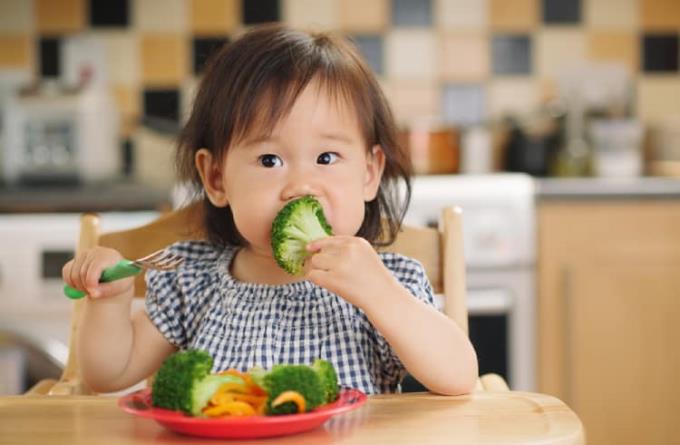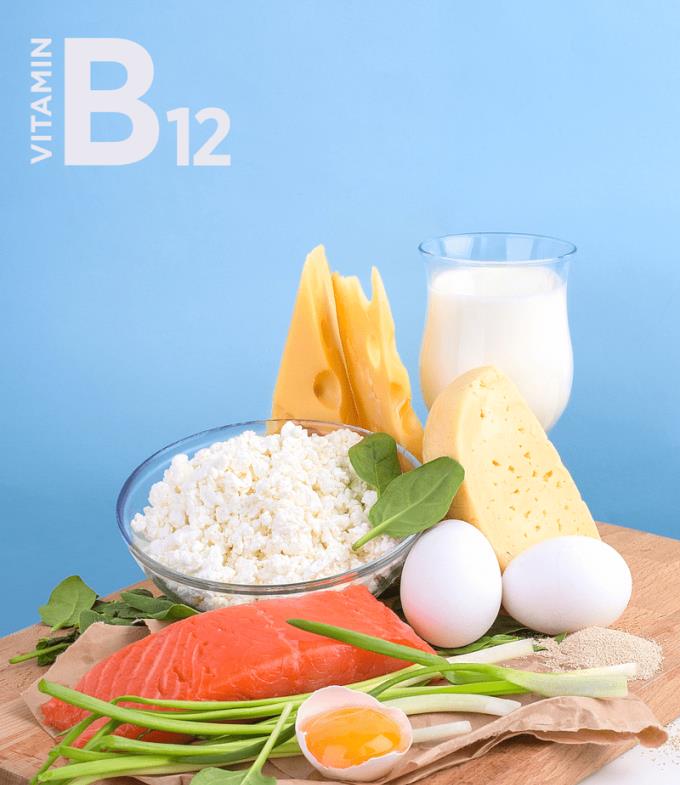Ways to determine an infants caloric needs

Learn how to determine your baby’s caloric needs, including the calories in breast milk and formula, to ensure your infant gets the right nutrition for healthy growth.
Your family has a vegetarian habit and you wonder if vegetarian feeding ensures your child's nutritional needs? When raising children on this diet, what should you pay attention to to keep your baby healthy?
You are a mother and a vegetarian, does cooking for yourself and your whole family in two vegetarian-savory ways make you feel tired? Be sure that sometimes you will have the intentions: "Why don't I let my child become a vegetarian for convenience too?". But in that line of thinking, you are afraid that if your child is vegetarian, he or she will not be healthy and develop as well as children with other diverse diets.
Do not worry too much because a reasonable vegetarian diet will provide all the essential nutrients for your child. The bottom line in this regard is that you must know how to formulate your child's diet and monitor your baby's eating to ensure their nutritional needs.

When it comes to vegetarianism, you will probably immediately think of people who always say no to meat. They give up delicious cuts of meat just to be friends with a “quartet” of vegetables - roots - fruits - mushrooms. It can be clearly seen that in their daily menu completely absent elements of protein or protein. Meanwhile, protein is the basic substance to build the body, accounting for 18% of the body weight and is a major component in human dietary needs. Most of the protein comes from meats, especially red meats. At this point, do not be confused to give up the idea of vegetarianism because aFamilyToday Health will list the benefits of a vegetarian diet right below:
Prevent constipation: The fact is that protein is not only found in meat, fish, eggs, and milk because some nuts, fruits as well as fruits are still rich in protein. Besides, they also provide more fiber to help prevent constipation in children effectively. In addition, they also have antioxidants that protect cells, vitamins and minerals for children to develop comprehensively.
Limiting the consumption of fat, cholesterol: Vegans will avoid the maximum tolerance of fats, especially saturated fat, cholesterol. These are substances that growing children hardly need.
Get plenty of vitamins: Many studies also show that vegetarians will receive more nutrients, especially vitamin B1 (thiamin), folate (folic acid), vitamin C, carotene and vitamin E compared to non-vegetarians. follow this diet.
Helps prevent a number of diseases: Fasting also helps children prevent some diseases such as cancer, hypertension, obesity in children. In fact, the percentage of people with these diseases will be higher than that of non-vegetarians.
In addition to the above benefits, vegetarian children will develop a more balanced , healthier and even longer life. For teenage children, fasting also works to reduce acne. If you practice vegetarian food from a young age, your child will form better eating habits in the future.
Answering this question will help you determine what type of vegetarian diet you are and will have a choice of foods that best suits your baby's diet. The fact that there is more than one type of vegetarian diet that you may not be aware of includes:
Lacto - ovo vegetarian diet: These people eat milk and eggs, but not meat and poultry.
Lacto Vegetarian: These vegetarians can eat milk, eggs, and fish, but not meat and poultry.
Vegan: These are people who don't eat milk, eggs, meat, poultry, and fish.
At this point, you must have determined what your vegetarian diet belongs to, right. Some recommended vegetarian foods for children to eat are: green vegetables, fruits, grains, mushrooms, legumes (soybeans, peas and legumes).
Please refer to the article: Which diet should vegetarian children follow and what should be noted?
You already know what the benefits of vegetarianism will get, but you are still not sure what to do about whether to give your child a vegetarian diet or not. Don't worry, aFamilyToday Health helps you to remove the knot for this question.
Dr. Reshma Sha, a pediatrician and associate clinical instructor at Stanford University School of Medicine (USA), said: A varied and calorie-dense diet can easily meet your needs. developing baby proteins. He also emphasized that legumes, seeds, nuts and whole grains are not only excellent sources of protein, but also excellent sources of fiber.
So how much protein is enough for children? According to the guidelines of the National Institute of Nutrition (USA), the protein requirements for a child each day are as follows:
Babies 1 to 3 years old should be given 13g
From 4 to 8 years old: need 19g
From 9 to 13 years old: 34g
Adolescents: needs between 46 and 52g.
Did you know that a cup of black beans will provide about 14g of protein, while a packet of cooked oatmeal will give your child about 6g of protein and a serving of peanut butter for your baby has up to 7g protein.

Although vegetarian foods provide a wide variety of essential vitamins and minerals, only a few contain all the essential nutrients. In addition, not every meal you or your baby will eat enough of those foods. Therefore, it is essential to develop a reasonable diet when feeding vegetarian children by adding additional missing nutrients.
The American Academy of Pediatrics agrees: "Children can be well nourished by a vegetarian diet". However, they also note that: "Nutritional balance is difficult to achieve if dairy products and eggs are completely removed from the diet" and encourage parents to carefully monitor and advance. a child's diet plan .
Dr. Sha also added that nutritional deficiencies can occur in children, especially those raised on a vegetarian diet, which should pay attention to supplementing with vitamin B12 or cobalamin . This vitamin is found almost exclusively in foods of animal origin. Vitamin B12 is essential in protecting the nervous system and for creating the body's genetic material (DNA).
Iron is a good trace element that should be taken into consideration. In vegetables, tubers and fruits still contain iron, but iron from these foods is harder to absorb into the body than animal sources of iron. Therefore, vegetarian children are more or less at risk of iron deficiency. A little secret to increase the absorption of iron into the body is that mothers can give their children more vitamin C or orange, lemon, and strawberry juice ...
Although there are many nutritious plant-based foods available, they have the downside of providing quite a bit of energy to the body. Meanwhile, children are often active, playing, so they need to provide enough energy for their daily activities.
Besides iron, mothers also need to supplement zinc if planning for a vegetarian child. Because zinc is also abundant in meat and is essential for a child's immature immune system.
The best way to get these essential nutrients without eating meat is to take baby multivitamins. But remember, it is important to consult with your pediatrician when attempting any dietary supplement. What is the most essential thing that mothers should do is to take care of their child's diet and nutrition for a vegetarian child or eat any meat.
Learn how to determine your baby’s caloric needs, including the calories in breast milk and formula, to ensure your infant gets the right nutrition for healthy growth.
Discover the top 5 smartest dog breeds in the world, including Border Collie, Poodle, German Shepherd, Golden Retriever, and Doberman Pinscher. Learn about their unique traits and why they are considered the most intelligent dogs.
Discover 7 nutritious and delicious ways to cook egg porridge for babies, including recipes with cheese, pumpkin, tomato, and more. Learn how to prepare baby-friendly egg porridge with our expert tips.
After a series of medical measures they obtained a complete human vascular system profile.
Watermelon is one of the fruits that many people love, not only cheap but also delicious, nutritious and refreshing in the summer. To get delicious watermelon pieces, show off your housewives, your artistic talents to cut beautiful pieces of watermelon.
aFamilyToday Health - The digestive system and body in each baby is different. Parents need to recognize notes to deal with when babies have a food allergy!
Babies need many factors for perfect development. aFamilyToday Health shares with parents things to keep in mind when babies are 8 weeks old so that parents can take care of their babies the best!
Babies need many factors for perfect development. aFamilyToday Health shares with parents things to keep in mind when babies are 18 weeks so that parents can take care of their babies the best!
Babies need many factors for perfect development. aFamilyToday Health shares with parents things to keep in mind when babies are 28 weeks old so that parents can take care of their babies the best!
Babies need many factors for perfect development. aFamilyToday Health shares with parents things to keep in mind when babies are 32 weeks old so that parents can take care of their babies the best!








